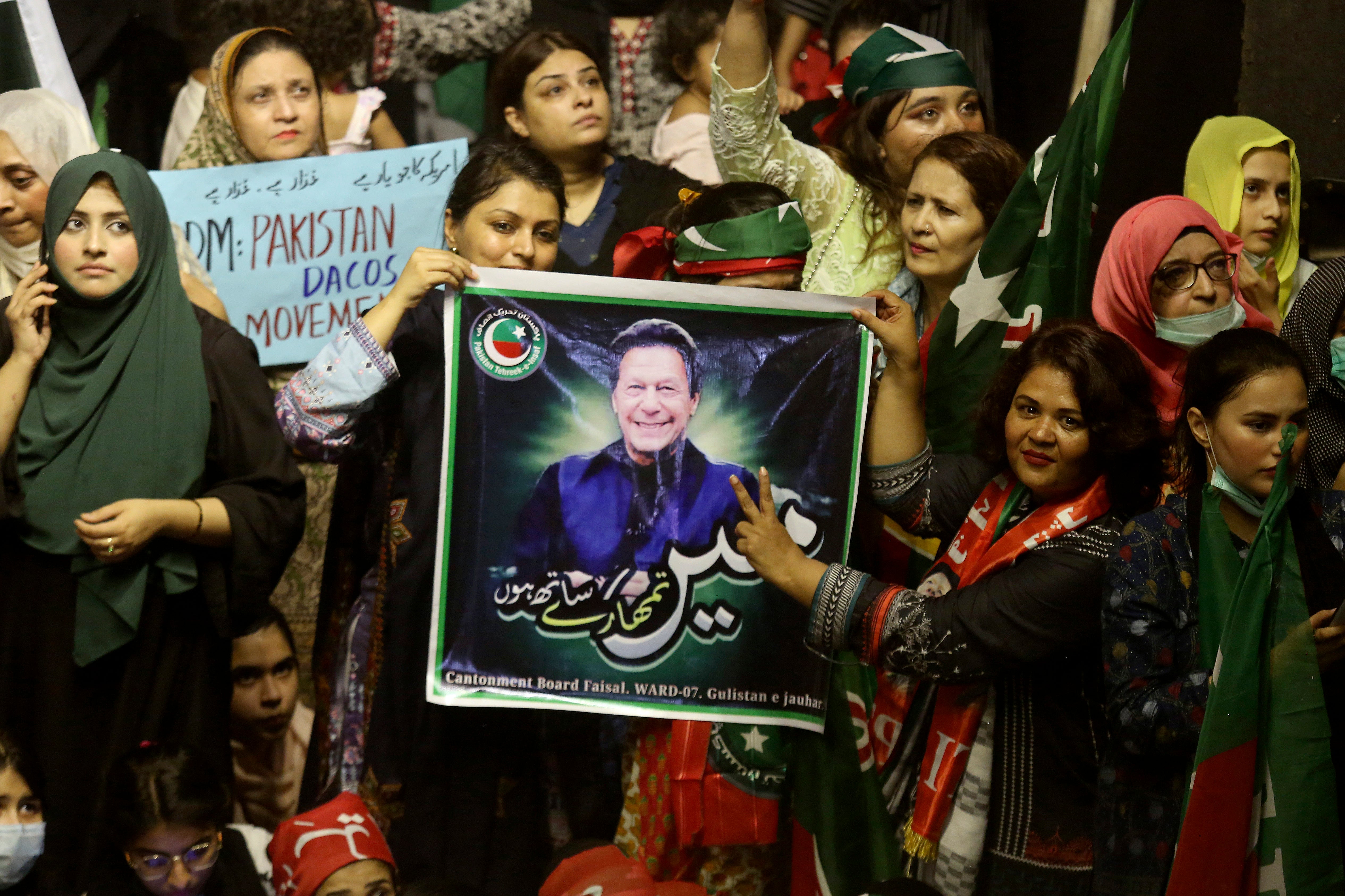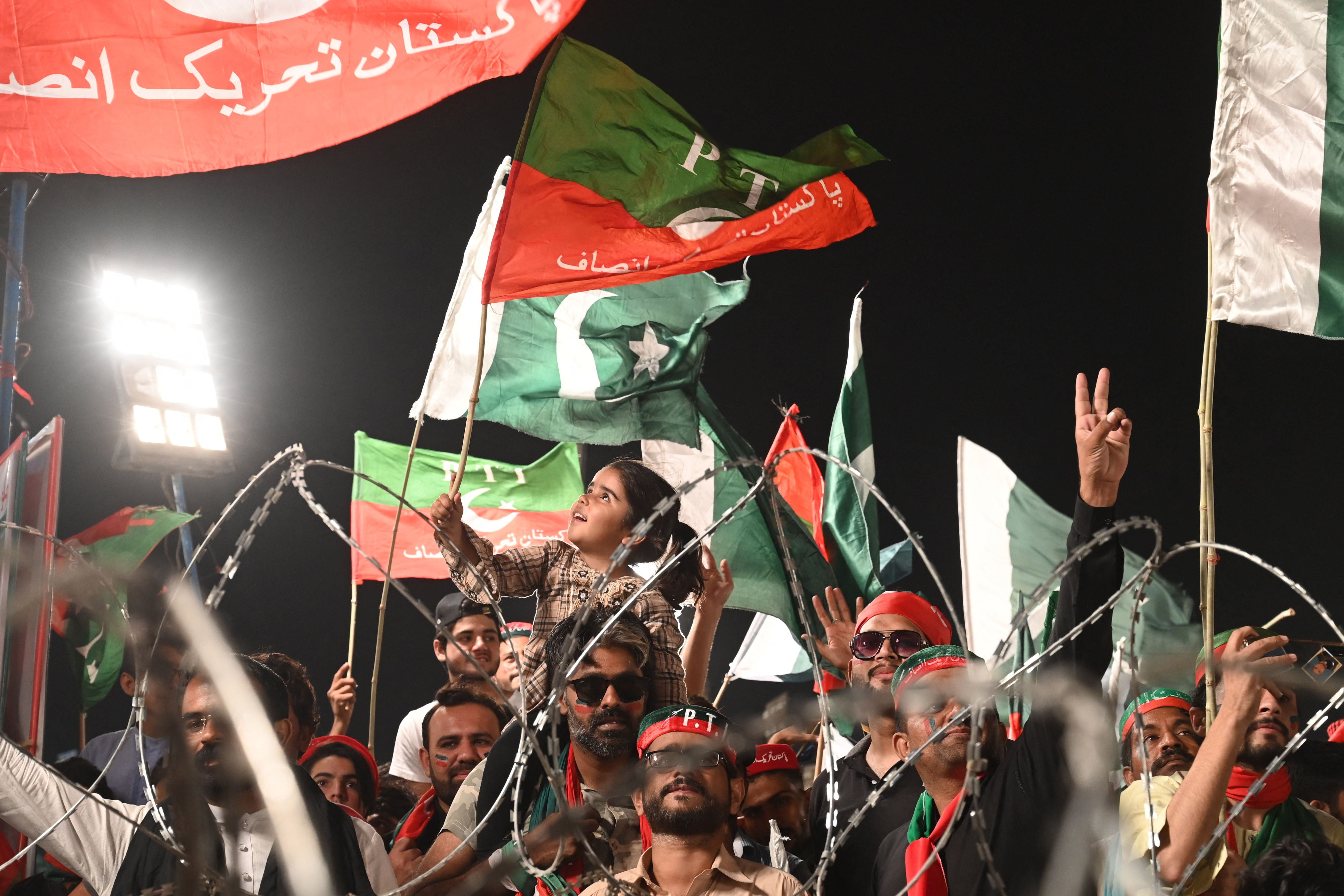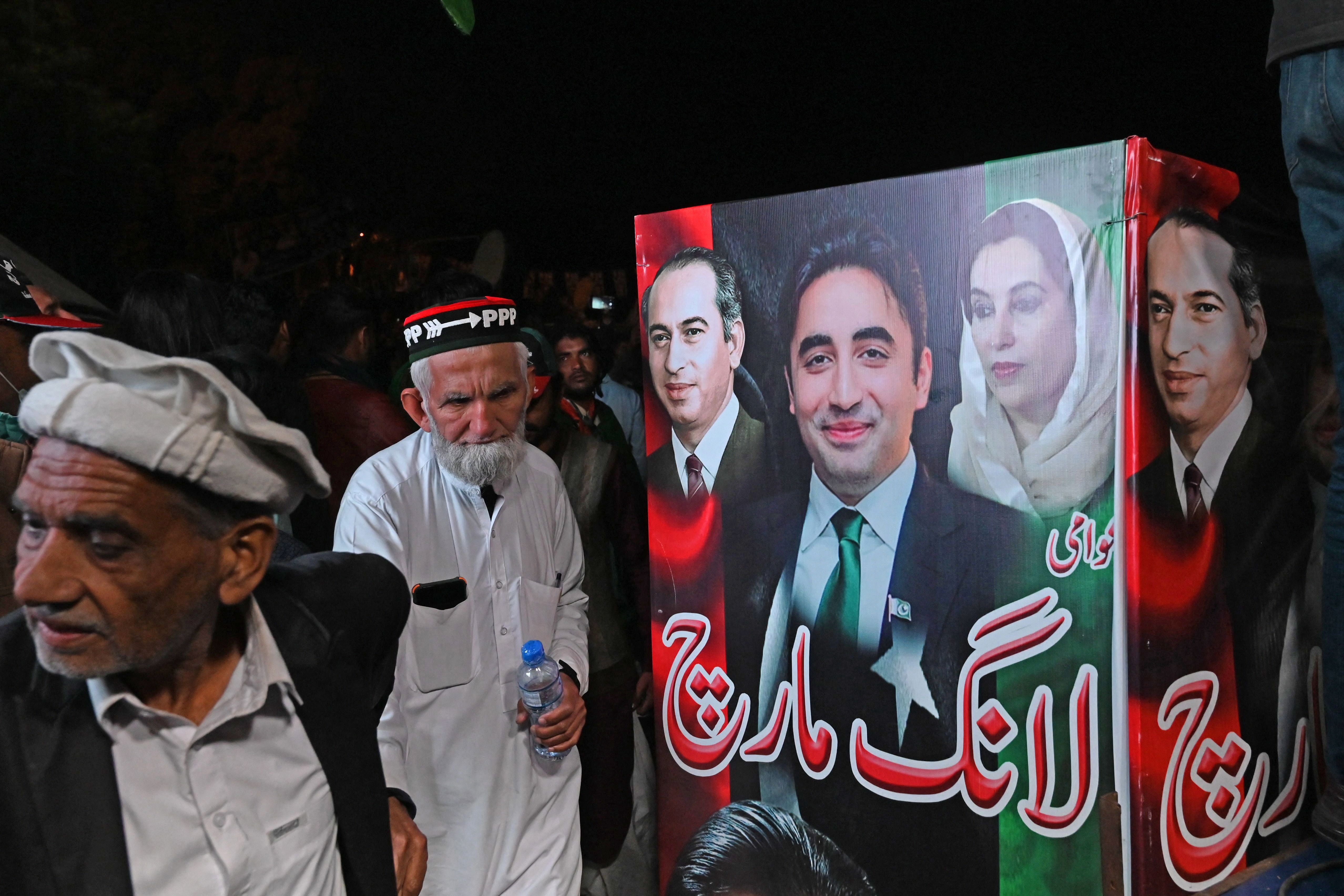With march on Islamabad and fears of ‘civil war’, Imran Khan is refusing to go quietly
As Pakistan’s former prime minister prepares to lead a huge march to the capital with his supporters, experts tell Stuti Mishra his ousting may just have revived his political career


When Pakistan’s former prime minister Imran Khan was ousted with a historic no-confidence vote in the national assembly last month, no one really expected him to leave office easily.
The 69-year-old cricket legend has tried every trick in the book to remain in power – his party’s speaker dismissed the no-confidence vote, Khan called massive rallies as a show of power and alleged a US-led foreign conspiracy was hatched to remove him after he met Vladimir Putin. At the time, however, none of it was enough to save his premiership.
On 10 April 2022, Khan became the first prime minister of Pakistan to be deposed through a no-confidence motion in parliament. Although no leader in the country’s history has been able to complete a full five-year term, Khan’s ousting was significant for several reasons – not least for bringing two arch-rival parties, the Pakistan Muslim League-Nawaz (PML-N) and the Pakistan People’s Party (PPP), together in a united front against him.
Many had predicted that to be the end of the political career of Khan, who rose to power with a promise of ending corruption and dynastic politics and a slogan of Naya Pakistan (New Pakistan). However, observers in Islamabad now feel the move might actually have revitalised a political career that was otherwise on the wane. And they fear he is now planning to take back the corridors of power in Islamabad by storm.
In a move that the new prime minister Shehbaz Sharif calls an act of “initiating a civil war in the country,” Khan has called all his supporters from across the nation to mobilise and march towards the capital Islamabad on Wednesday. His demands include the calling of immediate fresh elections and he says people will never accept the “imported government” of the Sharif and Bhutto families, two powerful political dynasties that have ruled Pakistan for decades, one after the other.
“We are ready to sacrifice our lives but will never accept these thieves ruling the country,” Khan told a news conference announcing his plans on Sunday. “We need a date for the fresh elections and a dissolution of the assemblies.”
He alleges the Sharif government is a puppet of the US, brought in against him because of his independent foreign policy stances. He has even suggested that several powers want to see him dead – a claim that does not ring entirely hollow in a country with a long history of leaders being assassinated.
Experts say that although his government of three-and-a-half years had been reeling under the pressure of rising inflation and failure to deliver on its promises, Khan’s ousting has actually made him a lot more popular.
Since the day of his removal, Khan has been holding massive gatherings in different cities around Pakistan, addressing a sea of supporters and reiterating his claims of American involvement in his ousting everywhere he goes. The US has denied any role in the events.

While the claims of US involvement may remain unproven, those who follow Islamabad’s political machinations say the turnout at his rallies has been unprecedented for any leader in Pakistan, a sign that Khan has managed to create huge amounts of sympathy for himself, and that the crowd answering his call on Wednesday could be equally impressive.
“When he was in power it was difficult for him to mobilise people in such huge numbers,” says Dr Qamar Cheema, a south Asia analyst based in Islamabad. “But [seeing ] the kind of protest he has conducted across the country, there is a possibility that there will be a huge turnout.”
Dr Cheema says the blistering heatwave that has descended upon the entire region, including large parts of India in recent weeks, might still play a role in deciding how people will respond to the call, but this is something he believes is “going to be very very serious”.
“If he [Khan] is in a position to bring more than 100,000 people and if they stay for some time here [in Islamabad], it may impact some kind of political scenario,” he adds.
Khan has been calling his long march a Jihad (holy war against evil), saying it goes beyond politics. “I’ve decided and told all my team [members] that we have to be ready to sacrifice our lives,” he said. His calls have been effective in bringing men and women alike out to protest, including in conservative-leaning areas where this would not typically be the case.
Mehr Tarar, a columnist and political analyst who has been a vocal supporter of Khan’s party, Pakistan Tehreek-e-Insaf (PTI), says “people have never protested like this for any leader” in Pakistan before.
“Usually, it is the political leaders that compel people to come out and attend their events – their teams go out and invite people to join in. But what is happening now, this awakening, is something we have not seen,” says Tarar.
However, interior minister Rana Sanaullah of the PML-N-led new coalition government announced on Tuesday evening that the march would be banned because the PTI failed to provide written assurances that the demonstrations would be carried out in a peaceful manner. But Khan and his supporters remain defiant.
Addressing a press conference in Peshawar, Khan said in response that he would be leading the “biggest procession in Pakistan’s history” on Wednesday and asked his supporters to reach Islamabad despite the ban.
Khan also accused the PML-N-led government of adopting the same tactics that military dictators in the country had dones since 1985 and lashed out at the police crackdown against the members of his party. PTI spokesperson Fawad Chaudhry on Tuesday said that more than 400 supporters of the party had been arrested across the country in the previous 24 hours, with the homes of many members being raided from midnight on Monday.
Earlier, authorities said they were prepared for Wednesday’s march and were not ruling out any options, including calling in the military to disperse the demonstrations.
Local media reports say barricades have been set up on the roads near Islamabad’s red zone, where government, judiciary and legislature buildings are located. Entry to the city has also been highly restricted since Monday, aimed at ensuring no demonstrators get in. Additional forces and paramilitary rangers have also been deployed.
Although the promised arrival of a sea of Khan supporters and the increased preparedness of the Sharif administration hint at a turbulent Wednesday, some analysts say widespread clashes or a situation akin to the “civil war” being touted might not materialise – because there is no other side to fight with.
“The ruling parties, PML-N and the People’s Party, are popular, but they are not in a position to challenge Imran Khan [through mobilisation of supporters],” says Dr Cheema. “Because they haven’t mobilised their people for a long time, they are over-confident about their influence in their constituencies.
“The government will need time to create a consensus on how to respond to [Wednesday’s] ‘Long March’,” he adds.

Tarar says the reasons for Khan’s public support are the same as the ones that brought him to power in the first place: the lack of options in the political spectrum, where two families have occupied all positions of power for decades.
“Pakistanis want Pakistan to be a democracy,” she says. “And dynastic politics has become a huge issue in the country. Not that people think Imran Khan is the answer to every question – it is that there is no other option.”
Experts say it is highly unlikely that Khan’s demand for immediate fresh elections will be met, given that the Election Commission of Pakistan has already made it clear that the country is months from being ready logistically for a nationwide vote.
However, the same issues that Khan’s PTI government was facing are just as troubling for the new coalition leadership – and Khan is not missing any opportunity to blame them for the rising prices of household essentials, the falling rupee and dwindling stock markets.
According to Tarar, Khan would return to power if elections were held tomorrow, and that is the reason the PML-N-led coalition will try to delay any vote.
“It’s a complete mess right now, so it makes sense that people would want fresh elections.”
“They [the united coalition of Sharifs and Bhuttos] came into power to make sure that elections are done in the way they want,” alleges Tarar. “They have come into power to make sure all those cases [against them] are taken down.”






Join our commenting forum
Join thought-provoking conversations, follow other Independent readers and see their replies
Comments